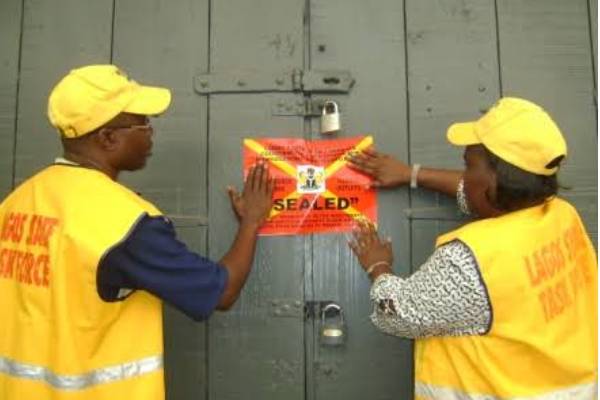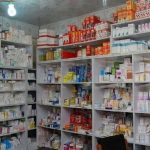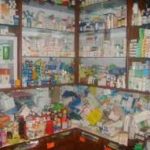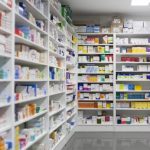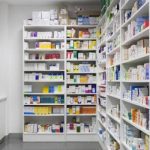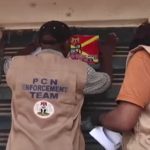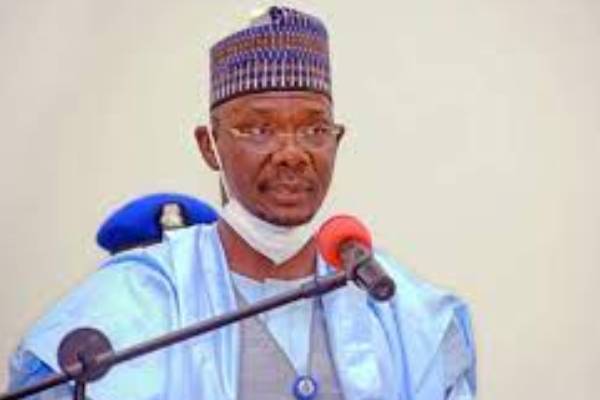More than three hundred and fifty pharmacies and patent medicine shops have been sealed by the pharmacists’ council of Nigeria for various offences including operating without proper registration.
This comes at the end of an enforcement exercise taken across the federal capital territory to sensitize the pharmaceutical space through proper improvement of standards.
Pharmacy after pharmacy the enforcement team of the pharmacists council of Nigeria go around to conduct checks.
One after the other, these medicine shops are scrutinized deeply by the team who have taken out time to go through more than five hundred and eighty shops across the FCT.
on hand are armed security personnel to ensure team’s safety as well as to certify that there’s no breakdown of law and order during the exercise.
The director of enforcement says this has become absolutely necessary due to the unsafe methods undertaken by some of these pharmacies.
The rapid increase of unregistered medicine shops has remained a major obstacle to the drive to end the indiscriminate sale of controlled drugs
The aim now is to ensure the reduction of the unregulated open drug markets.
Over the years the PCN has taken steps to address the challenges and has so far stepped up enforcement in this regard visiting more than thirty thousand pharmaceutical premises and sealing more than twenty thousand.
Harmful practices during storage can make medicines unsafe and ineffective for patients and other consumers.
The council says it will continue to carry out enforcement exercises such as this to ensure that medicines remain useful and safe for treatment for those who need it the most.
The issue of Drugs and Medication standards in Nigeria has been one that successive adminitration have grappled with over the last few years with the National Agency For Drugs Administration and Control, NAFDAC, being at the forefront of the battle.
NAFDAC was especially effective under the late Professor Dora Akunyili.
The Pharmaceutical Council of Nigeria which regulates Pharmaceutical practices has since embraked on a clampdown on the unregulated sales and marketing of mdeications especially by Patent Medicine Stores.
This move has also helped in reducing the workload on NFADAC especially in the monitoring of such activities in remote areas across the country.
More than three hundred and fifty pharmacies and patent medicine shops have been sealed by the pharmacists’ council of Nigeria for various offences including operating without proper registration.
This comes at the end of an enforcement exercise taken across the federal capital territory to sensitize the pharmaceutical space through proper improvement of standards.
Pharmacy after pharmacy the enforcement team of the pharmacists council of Nigeria go around to conduct checks.
One after the other, these medicine shops are scrutinized deeply by the team who have taken out time to go through more than five hundred and eighty shops across the FCT.
on hand are armed security personnel to ensure team’s safety as well as to certify that there’s no breakdown of law and order during the exercise.
The director of enforcement says this has become absolutely necessary due to the unsafe methods undertaken by some of these pharmacies.
The rapid increase of unregistered medicine shops has remained a major obstacle to the drive to end the indiscriminate sale of controlled drugs
The aim now is to ensure the reduction of the unregulated open drug markets.
Over the years the PCN has taken steps to address the challenges and has so far stepped up enforcement in this regard visiting more than thirty thousand pharmaceutical premises and sealing more than twenty thousand.
Harmful practices during storage can make medicines unsafe and ineffective for patients and other consumers.
The council says it will continue to carry out enforcement exercises such as this to ensure that medicines remain useful and safe for treatment for those who need it the most.
The issue of Drugs and Medication standards in Nigeria has been one that successive adminitration have grappled with over the last few years with the National Agency For Drugs Administration and Control, NAFDAC, being at the forefront of the battle.
NAFDAC was especially effective under the late Professor Dora Akunyili.
The Pharmaceutical Council of Nigeria which regulates Pharmaceutical practices has since embraked on a clampdown on the unregulated sales and marketing of mdeications especially by Patent Medicine Stores.
This move has also helped in reducing the workload on NFADAC especially in the monitoring of such activities in remote areas across the country.
More than three hundred and fifty pharmacies and patent medicine shops have been sealed by the pharmacists’ council of Nigeria for various offences including operating without proper registration.
This comes at the end of an enforcement exercise taken across the federal capital territory to sensitize the pharmaceutical space through proper improvement of standards.
Pharmacy after pharmacy the enforcement team of the pharmacists council of Nigeria go around to conduct checks.
One after the other, these medicine shops are scrutinized deeply by the team who have taken out time to go through more than five hundred and eighty shops across the FCT.
on hand are armed security personnel to ensure team’s safety as well as to certify that there’s no breakdown of law and order during the exercise.
The director of enforcement says this has become absolutely necessary due to the unsafe methods undertaken by some of these pharmacies.
The rapid increase of unregistered medicine shops has remained a major obstacle to the drive to end the indiscriminate sale of controlled drugs
The aim now is to ensure the reduction of the unregulated open drug markets.
Over the years the PCN has taken steps to address the challenges and has so far stepped up enforcement in this regard visiting more than thirty thousand pharmaceutical premises and sealing more than twenty thousand.
Harmful practices during storage can make medicines unsafe and ineffective for patients and other consumers.
The council says it will continue to carry out enforcement exercises such as this to ensure that medicines remain useful and safe for treatment for those who need it the most.
The issue of Drugs and Medication standards in Nigeria has been one that successive adminitration have grappled with over the last few years with the National Agency For Drugs Administration and Control, NAFDAC, being at the forefront of the battle.
NAFDAC was especially effective under the late Professor Dora Akunyili.
The Pharmaceutical Council of Nigeria which regulates Pharmaceutical practices has since embraked on a clampdown on the unregulated sales and marketing of mdeications especially by Patent Medicine Stores.
This move has also helped in reducing the workload on NFADAC especially in the monitoring of such activities in remote areas across the country.
More than three hundred and fifty pharmacies and patent medicine shops have been sealed by the pharmacists’ council of Nigeria for various offences including operating without proper registration.
This comes at the end of an enforcement exercise taken across the federal capital territory to sensitize the pharmaceutical space through proper improvement of standards.
Pharmacy after pharmacy the enforcement team of the pharmacists council of Nigeria go around to conduct checks.
One after the other, these medicine shops are scrutinized deeply by the team who have taken out time to go through more than five hundred and eighty shops across the FCT.
on hand are armed security personnel to ensure team’s safety as well as to certify that there’s no breakdown of law and order during the exercise.
The director of enforcement says this has become absolutely necessary due to the unsafe methods undertaken by some of these pharmacies.
The rapid increase of unregistered medicine shops has remained a major obstacle to the drive to end the indiscriminate sale of controlled drugs
The aim now is to ensure the reduction of the unregulated open drug markets.
Over the years the PCN has taken steps to address the challenges and has so far stepped up enforcement in this regard visiting more than thirty thousand pharmaceutical premises and sealing more than twenty thousand.
Harmful practices during storage can make medicines unsafe and ineffective for patients and other consumers.
The council says it will continue to carry out enforcement exercises such as this to ensure that medicines remain useful and safe for treatment for those who need it the most.
The issue of Drugs and Medication standards in Nigeria has been one that successive adminitration have grappled with over the last few years with the National Agency For Drugs Administration and Control, NAFDAC, being at the forefront of the battle.
NAFDAC was especially effective under the late Professor Dora Akunyili.
The Pharmaceutical Council of Nigeria which regulates Pharmaceutical practices has since embraked on a clampdown on the unregulated sales and marketing of mdeications especially by Patent Medicine Stores.
This move has also helped in reducing the workload on NFADAC especially in the monitoring of such activities in remote areas across the country.
More than three hundred and fifty pharmacies and patent medicine shops have been sealed by the pharmacists’ council of Nigeria for various offences including operating without proper registration.
This comes at the end of an enforcement exercise taken across the federal capital territory to sensitize the pharmaceutical space through proper improvement of standards.
Pharmacy after pharmacy the enforcement team of the pharmacists council of Nigeria go around to conduct checks.
One after the other, these medicine shops are scrutinized deeply by the team who have taken out time to go through more than five hundred and eighty shops across the FCT.
on hand are armed security personnel to ensure team’s safety as well as to certify that there’s no breakdown of law and order during the exercise.
The director of enforcement says this has become absolutely necessary due to the unsafe methods undertaken by some of these pharmacies.
The rapid increase of unregistered medicine shops has remained a major obstacle to the drive to end the indiscriminate sale of controlled drugs
The aim now is to ensure the reduction of the unregulated open drug markets.
Over the years the PCN has taken steps to address the challenges and has so far stepped up enforcement in this regard visiting more than thirty thousand pharmaceutical premises and sealing more than twenty thousand.
Harmful practices during storage can make medicines unsafe and ineffective for patients and other consumers.
The council says it will continue to carry out enforcement exercises such as this to ensure that medicines remain useful and safe for treatment for those who need it the most.
The issue of Drugs and Medication standards in Nigeria has been one that successive adminitration have grappled with over the last few years with the National Agency For Drugs Administration and Control, NAFDAC, being at the forefront of the battle.
NAFDAC was especially effective under the late Professor Dora Akunyili.
The Pharmaceutical Council of Nigeria which regulates Pharmaceutical practices has since embraked on a clampdown on the unregulated sales and marketing of mdeications especially by Patent Medicine Stores.
This move has also helped in reducing the workload on NFADAC especially in the monitoring of such activities in remote areas across the country.
More than three hundred and fifty pharmacies and patent medicine shops have been sealed by the pharmacists’ council of Nigeria for various offences including operating without proper registration.
This comes at the end of an enforcement exercise taken across the federal capital territory to sensitize the pharmaceutical space through proper improvement of standards.
Pharmacy after pharmacy the enforcement team of the pharmacists council of Nigeria go around to conduct checks.
One after the other, these medicine shops are scrutinized deeply by the team who have taken out time to go through more than five hundred and eighty shops across the FCT.
on hand are armed security personnel to ensure team’s safety as well as to certify that there’s no breakdown of law and order during the exercise.
The director of enforcement says this has become absolutely necessary due to the unsafe methods undertaken by some of these pharmacies.
The rapid increase of unregistered medicine shops has remained a major obstacle to the drive to end the indiscriminate sale of controlled drugs
The aim now is to ensure the reduction of the unregulated open drug markets.
Over the years the PCN has taken steps to address the challenges and has so far stepped up enforcement in this regard visiting more than thirty thousand pharmaceutical premises and sealing more than twenty thousand.
Harmful practices during storage can make medicines unsafe and ineffective for patients and other consumers.
The council says it will continue to carry out enforcement exercises such as this to ensure that medicines remain useful and safe for treatment for those who need it the most.
The issue of Drugs and Medication standards in Nigeria has been one that successive adminitration have grappled with over the last few years with the National Agency For Drugs Administration and Control, NAFDAC, being at the forefront of the battle.
NAFDAC was especially effective under the late Professor Dora Akunyili.
The Pharmaceutical Council of Nigeria which regulates Pharmaceutical practices has since embraked on a clampdown on the unregulated sales and marketing of mdeications especially by Patent Medicine Stores.
This move has also helped in reducing the workload on NFADAC especially in the monitoring of such activities in remote areas across the country.
More than three hundred and fifty pharmacies and patent medicine shops have been sealed by the pharmacists’ council of Nigeria for various offences including operating without proper registration.
This comes at the end of an enforcement exercise taken across the federal capital territory to sensitize the pharmaceutical space through proper improvement of standards.
Pharmacy after pharmacy the enforcement team of the pharmacists council of Nigeria go around to conduct checks.
One after the other, these medicine shops are scrutinized deeply by the team who have taken out time to go through more than five hundred and eighty shops across the FCT.
on hand are armed security personnel to ensure team’s safety as well as to certify that there’s no breakdown of law and order during the exercise.
The director of enforcement says this has become absolutely necessary due to the unsafe methods undertaken by some of these pharmacies.
The rapid increase of unregistered medicine shops has remained a major obstacle to the drive to end the indiscriminate sale of controlled drugs
The aim now is to ensure the reduction of the unregulated open drug markets.
Over the years the PCN has taken steps to address the challenges and has so far stepped up enforcement in this regard visiting more than thirty thousand pharmaceutical premises and sealing more than twenty thousand.
Harmful practices during storage can make medicines unsafe and ineffective for patients and other consumers.
The council says it will continue to carry out enforcement exercises such as this to ensure that medicines remain useful and safe for treatment for those who need it the most.
The issue of Drugs and Medication standards in Nigeria has been one that successive adminitration have grappled with over the last few years with the National Agency For Drugs Administration and Control, NAFDAC, being at the forefront of the battle.
NAFDAC was especially effective under the late Professor Dora Akunyili.
The Pharmaceutical Council of Nigeria which regulates Pharmaceutical practices has since embraked on a clampdown on the unregulated sales and marketing of mdeications especially by Patent Medicine Stores.
This move has also helped in reducing the workload on NFADAC especially in the monitoring of such activities in remote areas across the country.
More than three hundred and fifty pharmacies and patent medicine shops have been sealed by the pharmacists’ council of Nigeria for various offences including operating without proper registration.
This comes at the end of an enforcement exercise taken across the federal capital territory to sensitize the pharmaceutical space through proper improvement of standards.
Pharmacy after pharmacy the enforcement team of the pharmacists council of Nigeria go around to conduct checks.
One after the other, these medicine shops are scrutinized deeply by the team who have taken out time to go through more than five hundred and eighty shops across the FCT.
on hand are armed security personnel to ensure team’s safety as well as to certify that there’s no breakdown of law and order during the exercise.
The director of enforcement says this has become absolutely necessary due to the unsafe methods undertaken by some of these pharmacies.
The rapid increase of unregistered medicine shops has remained a major obstacle to the drive to end the indiscriminate sale of controlled drugs
The aim now is to ensure the reduction of the unregulated open drug markets.
Over the years the PCN has taken steps to address the challenges and has so far stepped up enforcement in this regard visiting more than thirty thousand pharmaceutical premises and sealing more than twenty thousand.
Harmful practices during storage can make medicines unsafe and ineffective for patients and other consumers.
The council says it will continue to carry out enforcement exercises such as this to ensure that medicines remain useful and safe for treatment for those who need it the most.
The issue of Drugs and Medication standards in Nigeria has been one that successive adminitration have grappled with over the last few years with the National Agency For Drugs Administration and Control, NAFDAC, being at the forefront of the battle.
NAFDAC was especially effective under the late Professor Dora Akunyili.
The Pharmaceutical Council of Nigeria which regulates Pharmaceutical practices has since embraked on a clampdown on the unregulated sales and marketing of mdeications especially by Patent Medicine Stores.
This move has also helped in reducing the workload on NFADAC especially in the monitoring of such activities in remote areas across the country.

